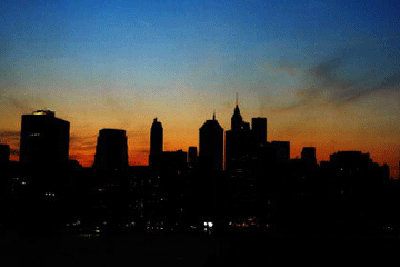Prepare or Die
Gib Kerr
 I awoke this morning from an unusually disturbing dream. In my subconscious mind, I was on the 30th floor of a downtown Kansas City apartment tower when the lights went out. All of them. Not only inside the building, but as far as I could see across the urban landscape. Nary a light to be found. I awoke this morning from an unusually disturbing dream. In my subconscious mind, I was on the 30th floor of a downtown Kansas City apartment tower when the lights went out. All of them. Not only inside the building, but as far as I could see across the urban landscape. Nary a light to be found.
The suddenness of it all struck me. In an instant, darkness consumed my world, on the darkest week of the year, no less. Worse yet, without power, I was unable to communicate with anyone, including the loved ones who came to mind at once.
The vastness of the power outage—extending as far as I could see across a city of over two million people—was unlike anything ever witnessed in modern times. I knew immediately that this was not an accident.
It had finally happened. Our enemies had struck, with the ruthless surprise of Pearl Harbor. Only worse, as a widespread attack on our power grid would impact hundreds of millions of Americans and lead to countless deaths in a matter of days.
The same dystopian nightmare behind scores of zombie apocalypse movies and frightening novels ceased to be a source of entertainment or hypothetical postulation. The reality—which hit me like a ton of bricks in my dream—was both sobering and terrifying.
Without the modern-day lifeblood of electricity, I was not only unable to communicate—no phones, no texting, no email—I had no access to news via the internet or television. I was in the dark, both literally and figuratively.
I had no way to withdraw money from my bank. My EV-driving neighbors were screwed, and so was I when I realized that I’d be unable to refuel my F-150. All the gas stations were inoperative.
Like millions of my fellow Americans, in a heartbeat I transitioned from comfortable pass times—watching TV, scrolling through social media, contemplating dinner or entertainment options—to the bare necessities of survival. Food and water, for the first time in my life, became my top priority.
Where would I go? How would I get there? How will I protect myself from other desperate, starving, or thirsty humans?
The average big city in America has only a three-day supply of food. A massive interruption of the supply chain—particularly one caused by a takedown of the electrical grid—will lead to complete chaos and inevitably to social breakdown. It will quickly become every man for himself.
Was this merely a dream, or was it some kind of divine admonition, like Noah’s warning before the Flood? Stories of dreams are found throughout the Bible. One of the most notable examples occurred in the Book of Genesis when Joseph interpreted Pharoah’s dream to predict seven years of prosperity followed by seven years of famine. His accurate prediction saved Egypt and made Joseph a top official in the land, ranking him among the most famous preppers in world history.
I have no delusions of being a modern-day biblical prophet and cannot divine the source of my dream. Perhaps it was merely my subconscious mind shouting the obvious to me: America is more vulnerable than ever due to our absolute dependence on electricity for nearly every aspect of our lives.
We’re all familiar with the adage about generals fighting the last war. We take false comfort in tanks, ships, submarines, tactical bombers, fighter jets, ICBMs, and all the accessories of the greatest military force in the history of mankind. Yet the next war is almost certain to begin with a massive cyberattack that brings us to our knees.
And then what?
How can we rally to defeat our enemies when we have no means to communicate, or even to provide food and water to the general population?
Our self-serving leadership in DC engages in petty political games, currying favor with wealthy corporate donors and electoral blocks—citing climate change and white nationalism as our greatest threats—essentially fiddling while our electrical grid and cybersecurity systems reduce us to sitting ducks.
The primary responsibility of government is to provide for the safety and security of its citizens. Yet today, millions of illegal invaders cross our southern border from nearly every nation on the planet—including many of our most ardent foes—and the federal government just lets it happen.
Meanwhile, our president and his allies in Washington, New York, and Silicon Valley are compromised by the Chinese Communist Party whose stealthy strategy of “elite capture” has effectively neutered American leadership’s resolve to defend our national interests.
Predatory powers like China, Russia, and Iran sense weakness and are seizing the opportunity to expand their reach. We see it in Ukraine, the Middle East, and in China’s threat to take Taiwan.
The parallels between Japan in the late 1930s and China today are chilling. Just as Japan lacked natural resources such as oil, steel, and food, modern China cannot feed its enormous population and faces economic headwinds that threaten the power base of the CCP. Desperate people do desperate things.
Is it so far-fetched to imagine that the CCP would capitalize on America’s leadership vacuum to invade Taiwan before the US elections in 2024? The Chinese are smart enough to realize that they may never have a better chance, with our feckless president and his woke advisors who are more concerned with pronouns, DEI, and climate change than protecting the safety of the American people.
An invasion of Taiwan might very well begin with an all-out attack on the US power grid and cybersecurity systems. Yes, such an attack would result in a massive hit to the Chinese economy, potentially leading to widespread starvation there. But the CCP—like their Marxist brethren in Russia—has shown its willingness to let their people die in droves.
What is the American government doing to prepare for such an eventuality? During the Cold War, we had air raid drills, stockpiles of food and water, and a vast network of “fallout shelters” in both public and private buildings. We were united against the common threat posed by the Soviet Union.
While I hope it’s not too late, we should mobilize our citizenry to face the very real possibility of life without electricity or internet communications. How about a civil defense plan to prepare for such an eventuality? If we hope to avoid mass casualties, it will require enormous reservoirs of food, potable water, and medical supplies—along with back-up power systems—particularly in and around our large cities.
Sadly, our military and homeland security are focused on trivial diversions—transgenderism, zero carbon emissions, and combatting the imaginary threat of white nationalism, for example—rather than working to ensure public safety. If the federal government fails to do its job, then perhaps the states will step up. As things stand today, though, we are all on our own. It is up to each and every one of us to prepare our own plan and to protect ourselves and our loved ones.
Stock up on food, water, basic necessities, and of course, don’t forget the guns and ammo. Prepare for the worst lest our national nightmare becomes reality.

Gib Kerr is the author of States of Rebellion, The Rise and Fall of the Ocasio-Cortez Administration, published by Bombardier Books. Visit www.gibkerr.com.
A native Missourian, Kerr’s life and work have afforded him the opportunity to travel extensively throughout the United States. The places and people of America – their stories past and present – inspire his writing.
www.gibkerr.com
| 

